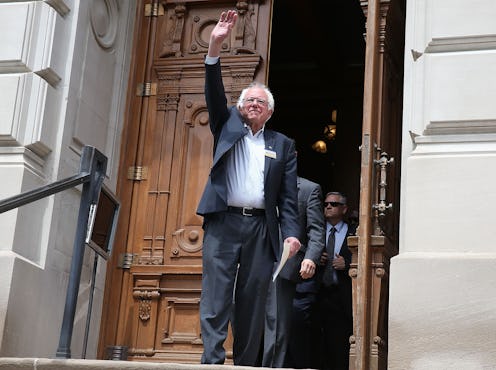News
Sanders' Chances As An Independent Don't Look Good
At this point in the race for the Democratic presidential nomination, it looks like Hillary Clinton's name will be on the ballot come November. Yet Sen. Bernie Sanders hasn't given up, and it seems like the progressive veteran doesn't want to — even if he loses the nomination. Or at least Sanders and his supporters who are feeling the Bern won't let defeat sideline them. There's been growing speculation among progressives this week that Sanders may run as an independent, but is it a viable option?
There are, of course, politicians who run as either independents or third-party candidates in almost every presidential election. In 2012, the biggest third-party candidate was former New Mexico Gov. Gary Johnson, who ran under the Libertarian Party banner and finished with 1 percent of the popular vote.
But to find true independent candidates, one must go back to the 2008 election, where former Green Party candidate Ralph Nader ran as an independent. Nader also ran for president as an independent in 2004. In both presidential elections, Nader came in third, but with less than 1 percent of the popular vote.
Although Nader's two presidential campaigns were admirable, it's Ross Perot who, so far, has had the most successful presidential campaign as an independent in modern U.S. history. In 1992, Perot ran against Bill Clinton and then-President George H.W. Bush and finished with more than 18 percent of the popular vote; however, Perot failed to garner any electoral college votes.
None of this bodes well for Sanders if he chooses to run on an independent ticket. In all of American history, only one candidate who ran as an independent has found himself in the White House: George Washington. Of course, if Sanders does run as an independent and win, it would put him in some fine company.
According to polling data accumulated by Real Clear Politics, Sanders could win against Donald Trump, the current front-runner for the Republican nomination. Sanders has a polling average of 52 percent when positioned against Trump, who trails at 37.8 percent. But the real question here is whether Sanders can oust Clinton. While Sanders has been closing the gap between him and Clinton over the last several months, he hasn't had enough momentum to really kick the campaign into high gear. Some of the latest polls, too, reveal that Clinton still has a steady lead over Sanders among registered Democrats. For instance, the latest poll from Reuters has Clinton polling at 53 percent, with Sanders a full 10 percentage points behind, according to the Huffington Post.
For Sanders, it seems like it's the Democratic ticket or nothing.
